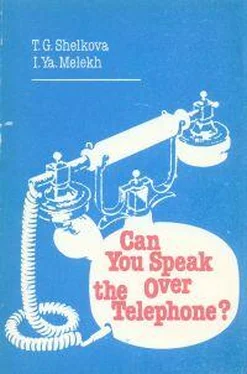a Mr Weston: the fact that the operator uses the indefinite article with the name indicates that she does not know the caller.
on the line: a standard phrase used by operators to refer to an incoming call
What can I do for you?: almost a fixed phrase, which is very often used as a polite way of asking someone what he wants
surveyorинспектор, приемщик
Splendid: an exclamation of approval which may sound to some people just a little too hearty or pompous
quick work: often used to refer to anything that has been done quickly, not simply a job or work; e.g. “You made quick work of that ice-cream”, where the implication is that ice-cream was eaten quickly.
you’ll be pleased to know: a fixed phrase which would be more appropriate in written English. It is one of the phrases which adds formality to this conversation, and would be unlikely in informal telephone conversations.
subsidenceосадка
You’ve taken a load off my mind: this phrase is colloquial, and is used by someone who has had a cause for worry or anxiety removed.
to hold things up: to delay proceedings (задержать работу)
the outstanding work: work that has not yet been completed. Contrast the frequent use of “outstanding” to imply “of outstanding merit, qualities”, etc., as in “He is an outstanding man in every way”, “She has done some outstanding work at school”.
the plating and polishing shopsплакировочный и полировочный цехи
then you can have a free hand: the sense is that there will be complete freedom from any hindrance: the “hands” of the workmen will be “free”.
That brings us to Thursday morning: note that idiomatic use of “bring” in such sentences as “That brings us to the next item to be discussed”.
put it in hand: give instructions to have the job started, e.g. “I’ve got the job in hand”, which means that the job is either being done, or is about to be started.
I’m not keeping you from anything: the meaning here is “I’m not preventing you from doing anything else (by talking to you)”.
I do have: note the use of “do” here, making the verb emphatic. The effect of the emphasis is softened, however, by the following clause beginning with but.
at your disposal: prepared to carry on the conversation. A bit of business phraseology.
carry on: continue. Contrast the colloquial use to mean “talk too much”, “make lengthy and tedious assertions”, as in “John is a nice chap, but he does carry on about his health”.
outlet ductвыходная труба
think to inspect: more usually one would expect to find “think of inspecting”, but “think” may be followed by “to” plus the infinitive form of the verb instead of “of plus present participle, as in “I didn’t think to tell him” vs. “I didn’t think of telling him”.
look, Mr Weston: note this rather informal use of the imperative ‘look” as a signal that the speaker wishes to call attention to a proposition or statement he is about to make.
loadingsнагрузка
Fine: an informal exclamation of approval or agreement
Not at all: one of the very few ways in English of replying to someone who has just said ‘Thank you”. For some people it has faintly comic overtones, and these are stronger with the comparable formula “Don’t mention it”. Normally, no reply to “Thank you” is absolutely necessary, but many people feel happier if they say something like ‘That’s all right”, “Pleased to help”, “Glad to be of assistance”, etc.
get things moving: an informal way of saying “order work to start”
what with that and this: because of that and this
up to my ears in it: overloaded with work
round fortyish: around forty years old
a little bit heavy-going: rather too serious or pompous
got his head screwed on the right way: clever, intelligent
on hand: available
a bit short-handed: short of staff/workers
on the packing side: in the packing department
like the clappers: very quickly
haven’t got round to: haven’t managed to do/begin
a bit tricky: rather difficult
a spot of: a little
bung: put, throw
all laid on: all arranged
I’m very well, thanks: a slightly formal reply to the question “How are you?” than either ‘Tine, thanks” or “Oh, not so bad; you know”.
I’m afraid: a common conversational way of introducing an apologetic note into what is being said
there: in that respect
organise: note this colloquial use of “organise” to mean “get, obtain” (by means of some kind of planning); e.g. “I feel hungry — I’m going to organise a sandwich for myself.”
to do smth. the hard way: to have difficulties to overcome; e. g. ‘The manager came up the hard way — he started as an errand boy.”
Great one for the open air: I have a strong liking for the open air. The phrase “a great one for” is sometimes used to indicate strong preferences, as in “Jimmy’s a great one for football”, etc. there often seems to be some humorous intent when the phrase is used.
our lot: our family
put up with: toletate. Note the difference of meaning with “put up” to mean “accommodate”, as in “They’ll put up noisy kids in that hotel”.
give Charles a ring: note the numerous verbs which have to do with making a telephone call. Some of these, beginning with the more formal and ending with the less formal ones are: ‘Telephone X, Ring X, Give X a ring, Give X a tinckle”.
Читать дальше












